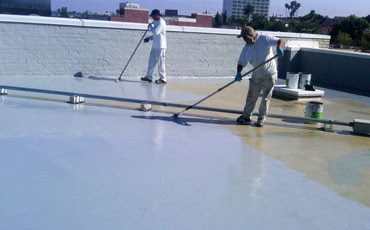Industrial buildings are subject to various environmental factors that can cause significant wear and tear over time. One of the most crucial yet often overlooked aspects of building maintenance is industrial roof waterproofing. Waterproofing not only protects the structure but also provides several cost-effective benefits that contribute to long-term savings. This blog explores the key financial advantages of industrial roof waterproofing and why it should be a priority for businesses.
1. Prevents Expensive Structural Damage
Water infiltration is one of the leading causes of structural deterioration in industrial buildings. When water seeps through cracks and leaks in the roof, it can weaken the structural integrity of the facility. This may lead to rusting of metal components, rotting of wooden elements, and even the development of mold and mildew, which can further compromise the safety of the structure. Investing in industrial roof waterproofing minimizes these risks and reduces the likelihood of costly structural repairs.
2. Reduces Maintenance and Repair Costs
A well-maintained waterproofed roof significantly reduces the need for frequent repairs. Without proper waterproofing, minor leaks can develop into major issues, requiring extensive repairs or even complete roof replacement. Regular maintenance of a waterproofed roof is far more cost-effective than dealing with emergency repairs caused by water damage. By preventing leaks and moisture buildup, businesses can save a substantial amount on maintenance expenses over the years.
3. Enhances Energy Efficiency and Reduces Utility Bills
Industrial buildings often rely on heating, ventilation, and air conditioning (HVAC) systems to maintain optimal indoor temperatures. Roof leaks and moisture infiltration can compromise the insulation of a building, forcing HVAC systems to work harder to regulate temperature. Waterproofing helps maintain insulation efficiency, reducing energy loss and lowering heating and cooling costs. As a result, businesses can enjoy significant savings on their energy bills.
4. Increases Roof Longevity
Replacing an industrial roof is a massive financial burden for any business. The cost of materials, labor, and downtime can add up quickly. Waterproofing extends the lifespan of the roof by preventing water damage, thermal expansion, and contraction caused by fluctuating temperatures. A longer-lasting roof means fewer replacements and lower long-term expenses, making waterproofing a cost-effective investment.
5. Protects Equipment and Inventory
Many industrial facilities store expensive machinery, raw materials, and finished products that are highly susceptible to water damage. A leaking roof can result in significant losses, including damage to inventory, machinery malfunctions, and disruption of operations. Implementing waterproofing measures ensures that valuable assets remain protected, reducing the risk of financial losses due to water-related damages.
6. Reduces Business Downtime and Loss of Productivity
Water damage can lead to operational disruptions, especially if repairs or replacements require shutting down part of the facility. Downtime not only affects productivity but also leads to revenue losses. By investing in industrial roof waterproofing, businesses can avoid unexpected disruptions and maintain smooth operations, ensuring continuous production and service delivery.
7. Minimizes Health Risks and Liability Costs
Moisture buildup from leaks can create an environment for mold and mildew growth, which can pose serious health risks to employees. Exposure to mold can lead to respiratory problems, allergies, and other health issues, increasing the chances of absenteeism and reduced workforce efficiency. Additionally, businesses may face liability claims if employees suffer health problems due to poor building maintenance. Waterproofing helps maintain a safe and healthy working environment, reducing the risk of potential legal and medical expenses.
8. Enhances Property Value
A well-maintained industrial building with a waterproofed roof is more attractive to potential buyers and investors. If a business ever decides to sell or lease its facility, a waterproofed roof can be a strong selling point. Buyers are more likely to invest in a property that requires minimal maintenance and has a long-lasting roof, making waterproofing a valuable asset that enhances property value.
9. Sustainable and Eco-Friendly Solution
Many modern waterproofing solutions are designed to be environmentally friendly. Reflective coatings used in waterproofing can help reduce heat absorption, lowering the need for excessive cooling and contributing to overall energy savings. Additionally, waterproofing prevents water wastage by reducing leaks and water seepage, making it a sustainable option for industrial buildings.
10. Cost-Effective in the Long Run
While the initial investment in industrial roof waterproofing may seem like an added expense, the long-term financial benefits far outweigh the costs. From preventing expensive structural damage to reducing energy bills and minimizing operational disruptions, waterproofing provides a significant return on investment. Businesses that prioritize waterproofing can enjoy prolonged roof lifespan, lower maintenance costs, and improved operational efficiency, making it a wise financial decision.
Industrial roof waterproofing is not just about preventing leaks; it is a strategic investment that offers numerous cost-saving benefits. By safeguarding the structure, reducing maintenance expenses, enhancing energy efficiency, and preventing business disruptions, waterproofing proves to be a financially sound decision for industrial facilities. Companies looking to optimize their budget while maintaining a safe and productive work environment should consider industrial roof waterproofing as an essential part of their building maintenance plan.
https://fastpanda.in/wp-admin



